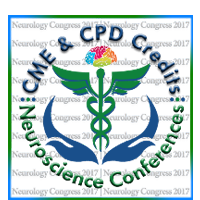
Khin Bo
Northern Lincolnshire & Goole NHS Foundation Trust, UK
Title: Multiple Sclerosis, Corpus Callosum & Bediside Test
Biography
Biography: Khin Bo
Abstract
Demyelination affects highly myelinated structures like Corpus Callosum (CC). CC is unique in function that it connects right and left hemisphere. It synchronises bimanual or bipedal activities. Affecting CC can disturb synchrony between the two hemispheres will affect bimanual and bipedal tasks. The aim is to see if speed of clapping (bimanual activity) can reflect the involvement of CC in Multiple Sclerosis. Consecutive 70 Multiple Sclerosis patients from Outpatient clinics and Home visits were tests for bimanual hand function (clapping) .Exclusion criteria are upper limb power <3/5 MRC scale, Pain, Visual impairment, Intentional tremors, Stroke or Cognitive impairment. Study period started from 01 09 2016. Comparison of speed between rapid supination/pronation of left and right hand separately and then clapping of both hands( supination/pronation of each hands alternatively). Patients had to do as fast as they could. Noticeable slowing of clapping comparing to single hand supination/pronation was taken as a sign slowing down of conduction through CC. 31 patients were excluded, 34 patients showed no noticeable difference, 2 patients were difficult to make conclusions and 3 patients showed definite slowing down in clapping. Positive patients will have difficulties in doing bimanual activities like using two sticks for mobility, typing using keyboard, pushing wheel chair bimanually etc. etc.. It is possible to detect CC involvement by doing above bedside test and can be used in Rehabilitation Setting. Sample size is not large enough and larger studies need to follow to validate the finding.

